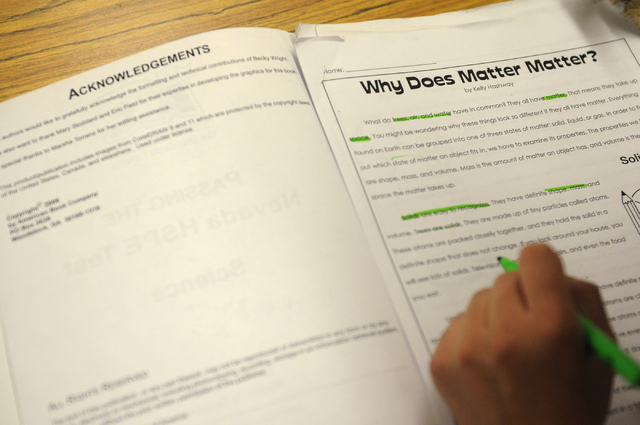Parent questions whether schools can require students to field test new exams

One question came to mind when Christina Leventis heard that her child and 44,000 other Nevada public school students would be used to field test new state exams for problems.
Can Nevada schools make students such as her 11th-grade daughter take the draft test that Leventis argues would be a favor to the testing company that needs to “test its test”?
The testing company, Smarter Balanced Assessment Consortium, has “a farm of children lining up to test their product,” said Leventis, who can’t “get past the fact that we’re doing this for free.”
Leventis, mother of a Coronado High School student in Henderson, got a response directly from Nevada’s Superintendent of Public Instruction Dale Erquiaga.
After receiving questions from Leventis and other parents, Erquiaga decided that parents “may request that their children be excused from field testing,” according to a memo sent to Nevada school districts March 21.
All Nevada students in third through eighth grade participate in the written Criterion Referenced Tests — usually called CRTs — given annually under state law but being replaced next school year by computerized tests. Students are not provided an opt-out from state exams, as allowed by California and other states.
The only way out of state-required testing in Nevada is to be absent.
However, state law doesn’t address required participation in “field tests,” Erquiaga found. “There’s no authority for me to require it.”
So he is directing all districts to allow parents a way out of the field test if they provide a written request for an exemption. Parents with questions about the field test should also be provided with the memo, making it clear they have a choice, he wrote to districts and reiterated in an interview Thursday.
The Clark County School District is doing that and nothing more, informing only those parents who ask not to participate in field testing. A recent district letter sent to all students involved in field testing said nothing about the opt-out choice.
“If you establish a procedure but don’t tell people about it, what’s the point?” said Leventis, citing the U.S. Education Department’s required 95 percent participation rate on annual assessments, as mentioned in Erquiaga’s memo. “I don’t want everyone to agree with me, but families should know their rights, their options.”
Leslie Arnold, the district’s assistant superintendent of assessment, accountability, research and school improvement, explained why the option isn’t being publicized.
Erquiaga isn’t requiring that either, for the same reasons.
The field test of the Smarter Balanced Assessment Consortium began in the last week of March and will extend through the end of the school year as part of a sample of the eligible students in the consortium’s 22 governing states, which includes Nevada. These states have adopted the exams, which depart from the traditional multiple-choice format in favor of more critical analysis and explanation.
At least one grade in schools in every Nevada county will be part of the field test, an effort to represent every racial, socioeconomic and educational-ability demographic, Erquiaga said. Of Nevada’s 234 field-test schools, 148 are in Clark County. All participating schools have been rated three to five stars by the state.
The fewer students that participate, the less Nevada input will be considered in deciding minimum passing scores and whether questions meet standards, Arnold said.
“If we’re not part of that, that’s quite unfortunate,” said Arnold, emphasizing that participation has “no repercussions. There are no consequences.”
Test results won’t be used to judge students or schools. They’ll be used to set the bar next year, correct errors and make changes to questions. More than 3 million students — picked from third through 11th grade classrooms — were chosen for the trial run.
Next year, more than 200,000 Nevada elementary and middle school students will be taking the tests by computer. No opt outs.
Erquiaga doesn’t foresee a slew of opt-out requests and hasn’t heard of many requests from districts thus far. Neither have other states involved in field testing, such as California.
“We haven’t heard of many, officially or anecdotally,” said Pam Slater, spokeswoman for the California Education Department, which is testing 3.2 million students in the target grades.
Erquiaga said he wants a “clean field test” with high participation but empathizes with the contingent of concerned citizens wanting out.
“At the core, most of them are parents or grandparents,” he said. “They’re just worried about the education of their kids. I completely understand that.”
About 1,600 Nevada students have completed the field test with 1,900 others in progress, Erquiaga said Friday. Among the consortium states, 1.08 million field tests have been completed.
At least one Nevada parent, Leventis, won’t have her child taking the field test. She has persuaded others to do the same, giving them forms to make the request.
“It’s not my intention to skew and mess up the data,” said Leventis, acknowledging the need for tests. “I understand there’s a bar and our children have to reach it. But we need to protect the students and be involved.”
Contact Trevon Milliard at tmilliard@reviewjournal.com or 702-383-0279. Find him on Twitter: @TrevonMilliard.